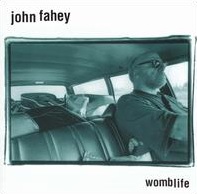Womblife
 From Wikipedia the free encyclopedia
From Wikipedia the free encyclopedia
| Womblife | ||||
|---|---|---|---|---|
 | ||||
| Studio album by | ||||
| Released | August 12, 1997 | |||
| Recorded | 1996 | |||
| Genre | Experimental, avant-garde | |||
| Length | 45:29 | |||
| Label | Table of the Elements | |||
| Producer | Jim O'Rourke, John Fahey | |||
| John Fahey chronology | ||||
| ||||
Womblife is an album by American fingerstyle guitarist and composer John Fahey, released in 1997. It was one of three releases by Fahey that year.
History[edit]
Womblife continues John Fahey's career resurgence, again bearing minimal resemblance to his earliest work. It incorporates sound collages and experimental music.
Working with Jim O’Rourke, Fahey taped Womblife in the younger musician’s bedroom. O'Rourke has been long associated with the experimental and improv scene, frequently citing Fahey as an influence on his work. Echo, loops and samples along with guitar are used in musique concrète, a style Fahey used as far back as 1968's Requia.[1] O'Rourke plays guitar on "Juana".[2]
Reception[edit]
| Review scores | |
|---|---|
| Source | Rating |
| Allmusic | |
| Encyclopedia of Popular Music | |
| The Great Folk Discography | 7/10[5] |
Womblife was one of three releases by John Fahey in 1997. All three (including the album City of Refuge and the EP The Mill Pond) were experimental and avant-garde and were unexpected by his long-time fan base. Music critic Brian Olewnick of Allmusic highly recommended the release, started his review with "This is not your father's John Fahey.", calling it "...one of the more overtly experimental albums in the Fahey catalog and also one of the most fascinatingly beautiful."[3] Steve Taylor of Hollow Ear said of it, "This is one of the most dangerous sounding acoustic guitar recordings you are likely to encounter" and "the sound of it is cold, dark and hellish.", "raw and unpleasantly intoxicating".[6] Both critics cite "Juana" as a more conventional track.
Richard Gehr referred to it as "echoing", an ".. innovative electric album...".[7] Stewart Voegtlin of Stylus Magazine called it "... a complex record that marries musique concrete to bottleneck blues. It doesn’t always work: one often strains to hear the guitar over the invasive din."[8]
Reissues[edit]
- All of Womblife was reissued on the Table of the Elements 2006 compilation release Sea Changes & Coelacanths: A Young Person's Guide to John Fahey.
Track listing[edit]
All songs by John Fahey.
- "Sharks" – 9:20
- "Planaria" – 9:54
- "Eels" – 6:13
- "Coelacanths" – 7:28
- "Juana" – 12:34
Personnel[edit]
- John Fahey – guitar, tapes
- Jim O'Rourke – guitar on "Juana"
Production notes:
- Jim O'Rourke – producer
- Jeff Hunt – artwork, design
- Susan Archie – artwork
- Bettina Herzner – photography
References[edit]
- ^ Taylor, Derek (December 2006). "Review: Sea Changes & Coelacanths: A Young Person's Guide to John Fahey". Dusted Magazine. Retrieved April 5, 2010.
- ^ Lowenthal, Steve (2014). Dance of Death: The Life of John Fahey, American Guitarist. ISBN 978-1-6137452-2-9.
- ^ a b Olewnick, Brian. "Review: Womblife". Allmusic. Retrieved April 6, 2010.
- ^ Larkin, Colin (2011). The Encyclopedia of Popular Music (5th concise ed.). Omnibus Press. ISBN 978-0-85712-595-8.
- ^ Strong, Martin Charles (2010). The great folk discography. Volume 1, Pioneers & early legends. ISBN 9781846971419.
- ^ Taylor, Steve. "Review: Womblife". Hollow Ear. Retrieved April 6, 2010.
- ^ Gehr, Richard. "Tormented Genius John Fahey had Rekindled Creative Fire". VH1. Archived from the original on May 11, 2010. Retrieved March 29, 2009.
- ^ Voegtlin, Stewart (February 2002). "Review: Sea Changes & Coelacanths: A Young Person's Guide to John Fahey". Stylus Magazine.